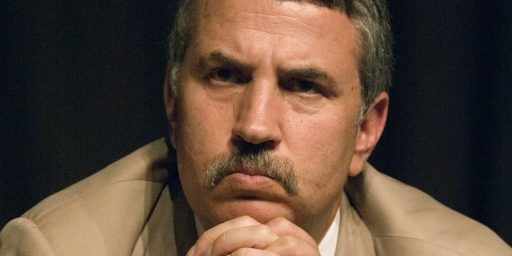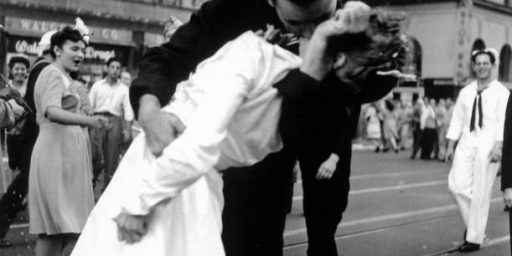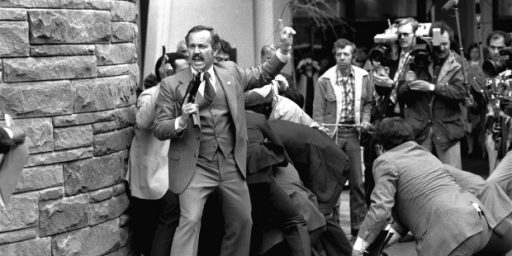Friedman the Scholar
 Thomas Friedman begins his latest column thusly:
Thomas Friedman begins his latest column thusly:
Twenty years ago, I wrote a book about the Middle East, and recently I was thinking of updating it with a new introduction. It was going to be very simple — just one page, indeed just one line: “Nothing has changed.”
It took me two days covering the elections in Beirut to realize that I was dead wrong.
Methinks I shall skip buying or paying any attention to said book.
I like Friedman. He’s an engaging writer who has carved out a sizable niche in the foreign policy and international political economy niches by synthesizing disparate information into cutesy, easily digestible phrases and oversimplifications. While the ensuing lack of nuance can be maddening for a subject matter expert, we desperately need popularizers to help non-experts broadly understand complex subjects that impact public policy.
But criminey. This guy is selling himself as some sort of Middle East expert. He thought nothing had changed in twenty years. That’s already dubious as hell but one could make an interesting, existential case for that being so. But to then have one’s entire vision upended in a two day trip — knowing Friedman, he talked to a cab driver, a waiter in a 5-star hotel restaurant, and a young mid-level politico whose English is superb owing to having summered in the Hamptons — is proof positive you’ve got no business writing a book about the subject.
And what phenomenal revelations about life in the Middle East caused Friedman’s epiphany?
- They have the Internet there now.
- Also, television.
Seriously. That’s it.
I was last in the region in the summer of 2001. I already knew these things. I’m guessing that, if you’re reading this, you knew these things, too. When do I get my book deal and NYT column? I’m obviously way ahead of this guy.
Odd side note: A second edition of From Beirut to Jerusalem was published in 1995. It has a chapter that did not appear in the 1989 edition. So, apparently, either 1) Friedman didn’t write that additional chapter; 2) that additional chapter was crap; 3) Friedman thought that chapter had been OBE and therefore returned us to the status quo ante; or 4) some possibility I’m not considering.






As an illustration of the changes in the entire region consider Saudi Arabia. In 1989 the population was roughly 16 million. Now its population is roughly 29 million. Said another way nearly half the people in the country hadn’t been born when his book was originally published. Can anyone doubt that is attended by social changes we can only speculate on?
I know there are are Friedman “haters” (not in the literal sense, in the pop sense). It strikes me now that they are a little like Malcolm Gladwell haters. It isn’t so much that the guy is always wrong or hugely wrong. It’s more that some seem to expect a lot more from them … that they always be hugely correct? That every idea be an insight never glimpsed before by man?
FWIW, I think Friedman is right about half the time, which is a pretty good average for a media darling. Gladwell maybe 3/4. Plenty good.
I can just about find a charitable reading of Friedman’s “nothing has changed” impulse, based on a talk about the book he gave at my then-bookstore, but it’s a charitable reading that can’t also explain “but wait! internet! whoah!” So oh well.
The hell of it is, From Beirut to Jerusalem is a damn good book of the sort that Friedman couldn’t write these days. Because it’s a reporter’s book. Back then he didn’t just talk to cab drivers and COOs, he talked to everyone. And he was on the ground day-to-day in Lebanon when that took guts. He was a guy who would talk to high officials in the Israeli government and the PLO, and grunts in the various armies and militias. There’s a nice section about having lunch with, I think, Amos Oz.
The tragedy is that that book got him promoted out of a job he did well into one he does poorly.
The added chapter mainly dealt with Friedman’s thoughts on the Oslo accords. As he is writing from Washington at the time, it lacks the interest that his reporting from Lebanon had.
The Peter Principle.